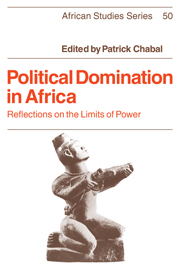Book contents
- Frontmatter
- Contents
- Acknowledgements
- Introduction: Thinking about politics in Africa
- 1 Democracy in Africa
- 2 Politics and vision in Africa: the interplay of domination, equality and liberty
- 3 Democracy and ethnocentrism
- 4 Wails and whispers: the people's voice in West African Muslim politics
- 5 Revolutionary democracy in Africa: the case of Guinea-Bissau
- 6 Civil society in Africa
- 7 Political accountability in African history
- 8 The politics of representation and good government in post-colonial Africa
- Notes
- Index
2 - Politics and vision in Africa: the interplay of domination, equality and liberty
Published online by Cambridge University Press: 26 January 2010
- Frontmatter
- Contents
- Acknowledgements
- Introduction: Thinking about politics in Africa
- 1 Democracy in Africa
- 2 Politics and vision in Africa: the interplay of domination, equality and liberty
- 3 Democracy and ethnocentrism
- 4 Wails and whispers: the people's voice in West African Muslim politics
- 5 Revolutionary democracy in Africa: the case of Guinea-Bissau
- 6 Civil society in Africa
- 7 Political accountability in African history
- 8 The politics of representation and good government in post-colonial Africa
- Notes
- Index
Summary
[Alexis de Tocqueville] brought to modern democracy neither the enthusiasm of those who expected from it a transfiguration of the human lot nor the hostility of those who saw in it no less than the very decomposition of human society. Democracy, for him, was justified by the fact that it strove for the well-being of the greatest number; but this well-being would be without brilliance or grandeur, and it would always be attended by risks.
Raymond AronAlexis de Tocqueville was concerned with the meaning of democracy, as are many Africans and Africanists today. In this chapter I will discuss the difficulties of relating the realities of everyday politics to visions of a better society. First, I sketch out the notion of an early modern patrimonial administrative state. Such states are, with few exceptions, authoritarian in nature. Next I analyse a similar form of rule in nineteenth-century Latin America, as well as its most interesting democratic exception – Chile. I then apply the argument to Nigeria under both authoritarian and democratic rule, stressing the nature of politics, the role of the military, the tensions between liberty and equality, and the impact of what is characterised as the ‘ideology of development’. In conclusion, I discuss the interplay of politics and vision and the three-way tension between domination, equality, and liberty in contemporary Africa.
NOTE ON DEFINITION AND CAUSAL ANALYSIS
I employ a rather strict and orthodox definition of democracy to include most of the characteristics associated with ‘liberal democracy’ as it developed out of complex socioeconomic and political struggles in Western Europe.
- Type
- Chapter
- Information
- Political Domination in Africa , pp. 30 - 51Publisher: Cambridge University PressPrint publication year: 1986
- 18
- Cited by

